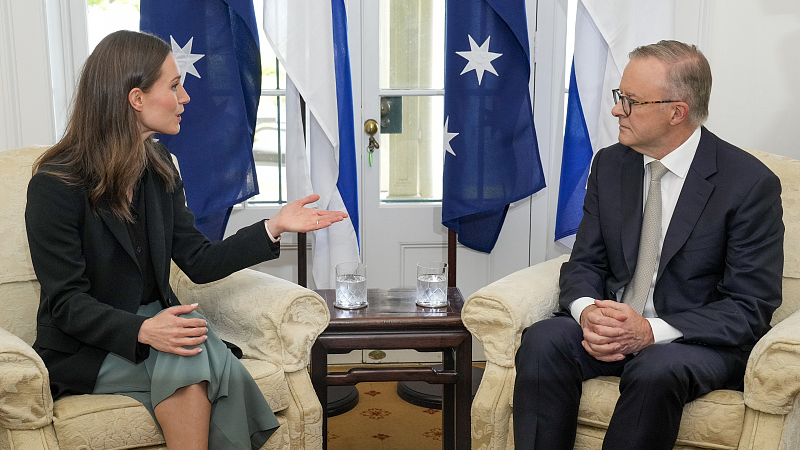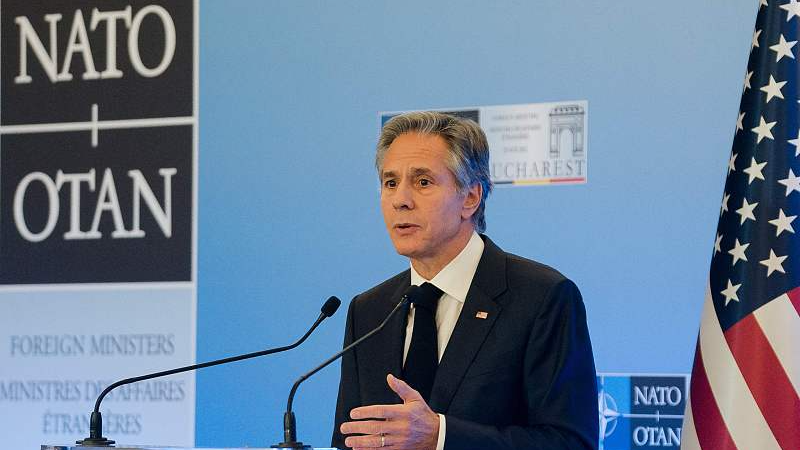
The Prime Minister of Finland Sanna Marin talks with Australian Prime Minister Anthony Albanese at Kirribilli House in Sydney, Australia, December 2, 2022. /CFP
The Prime Minister of Finland Sanna Marin talks with Australian Prime Minister Anthony Albanese at Kirribilli House in Sydney, Australia, December 2, 2022. /CFP
Editor's note: Hafijur Rahman is a columnist and Security and Strategic analyst, working in a prominent Strategic Studies Center in Bangladesh. The article reflects the author's opinions and not necessarily the views of CGTN.
Finnish Prime Minister Sanna Marin visited Australia on December 2 and said that Europe is "not strong enough" without the U.S. She said, "We should make sure that we are stronger. And I'll be brutally honest with you, Europe isn't strong enough. We would be in trouble without the United States," as the Guardian newspaper reported. While insisting on Europe's urgency to build its own defense capabilities, she added, "We have to make sure that we are also building those capabilities when it comes to European defense, the European defense industry, and making sure that we could cope in different kinds of situations."
In May, Finland, along with Sweden, applied to join NATO, while awaiting Turkey and Hungary to ratify those applications.
The Finish Prime Minister's remarks have re-sparked the debate on European "strategic autonomy" – a popular catchphrase in European political semantics for the past several years; but has waned since the eruption of conflict in Ukraine. Dating back to 2013, the discourse on European "strategic autonomy" re-surged after former U.S. President Donald Trump entered the White House from 2017 to 2021 and his anti-transatlantic remarks gained political traction in America, which had led to political jitters in Brussels. The outbreak of the COVID-19 pandemic reinforced the idea that inspired European Council President Charles Michel to proclaim in 2020 that "European strategic autonomy is goal number one for our generation," and the EU's "new common project for this century."
Strategic autonomy, though hazy in practice, has set to encompass a host of initiatives – ranging from sovereign foreign policy to the defense sector to the European industry – for the bloc's drive to support self-sufficiency. But, with the conflict in Ukraine, the discourse has been curtailed to a single aspect concerning strategic autonomy – increasing European defense capability. The European countries announced increases to their respective defense budgets of roughly €200 billion ($196 billion) in the three months following the Ukraine conflict.

U.S. Secretary of State Antony Blinken holds a press conference during a meeting of the NATO Ministers of Foreign Affairs, Bucharest, Romania, November 30, 2022. /CFP
U.S. Secretary of State Antony Blinken holds a press conference during a meeting of the NATO Ministers of Foreign Affairs, Bucharest, Romania, November 30, 2022. /CFP
Washington has long sought this from the bloc, particularly from its NATO allies in Europe. The conflict in Ukraine has become an opportunity for the U.S. Although Trump had threatened to pull the U.S. out of NATO, the eruption of the Ukraine conflict and the U.S. offering to provide strategic security to Europe has turned the EU into a tool for Washington's hegemony.
But European "strategic autonomy" should not just be about increasing the EU's defense spending and defense capacity. It should be contingent on setting its own "strategic compass to develop a sovereign, European strategy" other than one influenced by an obsolete transatlantic dogma. Brussels should separate European interests and strategic culture from American self-interests that is perpetuating power to preserve its global influence.
Strategic autonomy does not infer the EU's divorce from the U.S. But to strengthen its "role inside the European security architecture," autonomously maneuver its strategic path across multiple alternatives to interpret emerging security challenges, and to avoid confrontations far away from its strategic compass. Such intentions require more independence from Washington's influence. Here begs the question: How far would the U.S. allow the EU to walk in pursuit of its strategic autonomy?
The Joe Biden administration hopes to integrate Europe into the U.S. strategic track of so-called "great power competition with China." But China does not pose a threat to European security. Meanwhile, pushing hard on NATO's "Indo-Pacification" indicates the other way around. NATO's newly adopted Strategic Concept document at the Madrid summit this year, mentioned China for the first time and referred to it as a "systemic challenge." This points to Washington's efforts to tie the region's security to security developments in the "Indo-Pacific." Yet, the "Indo-Pacific" is a rhetorical device used by the United States to include India in its "Quad" balancing strategy in East Asia. Now to offset Washington's "binary position" in the so-called Indo-Pacific and bandwagon as many countries into its perilous containment march against China as possible, the U.S. is dragging Europe down.
To achieve "strategic autonomy," European countries must better define their "strategic compass" in light of their strategic and national interests – not of one determined by the so-called liberal internationalism of the unipolar 1990s that has become obsolete. They should accept the rise of multipolarity, since the global system is headed for a transformation in the 21st century.
Therefore, the faster Europe can shake off from "the American political consensus" about China as propagated by the former Trump administration and adopted by the Biden administration, the sooner it can achieve true "European strategic autonomy."
(If you want to contribute and have specific expertise, please contact us at opinions@cgtn.com. Follow @thouse_opinionson Twitter to discover the latest commentaries on CGTN Opinion Section.)